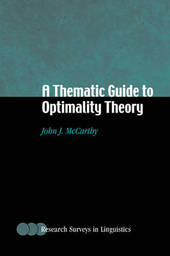
|
A Thematic Guide to Optimality Theory
Paperback / softback
Main Details
| Title |
A Thematic Guide to Optimality Theory
|
| Authors and Contributors |
By (author) John J. McCarthy
|
| Series | Research Surveys in Linguistics |
|---|
| Physical Properties |
| Format:Paperback / softback | | Pages:332 | | Dimensions(mm): Height 228,Width 153 |
|
| Category/Genre | Grammar and syntax |
|---|
| ISBN/Barcode |
9780521796446
|
| Classifications | Dewey:415 |
|---|
| Audience | | Professional & Vocational | |
|---|
| Illustrations |
127 Line drawings, unspecified
|
|
Publishing Details |
| Publisher |
Cambridge University Press
|
| Imprint |
Cambridge University Press
|
| Publication Date |
20 December 2001 |
| Publication Country |
United Kingdom
|
Description
This book describes Optimality Theory from the top down, explaining and exploring the central premises of OT and the results that follow from them. Examples are drawn from phonology, morphology, and syntax, but the emphasis throughout is on the theory rather than the examples, on understanding what is special about OT and on equipping readers to apply it, extend it, and critique it in their own areas of interest. The book's coverage extends to work on first- and second-language acquisition, phonetics and functional phonology, computational linguistics, historical linguistics, and sociolinguistics. Chapters conclude with extensive suggestions for further reading, classified by topic, and are supplemented by a massive bibliography (over 800 items).
Reviews'The most attractive virtue of this book is that it is designed to be user-friendly ... I believe that this book makes a considerable contribution to the field ... we would like to welcome this book as a textbook or an adjunct to another textbook or a reference.' Studies in English Literature 'Overall, McCarthy's Thematic Guide to OT is an excellent research survey that I highly recommend to schoalrs and graduate students interested in phonology and in linguistic science in general ... McCarthy's Guide, thus, should be considered a remarkable attempt to offer a global perspective on Optimality Theory as a model of Universal Grammar.' Canadian Journal of Linguistics
|